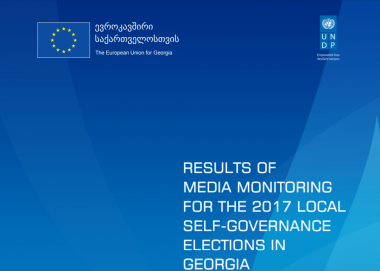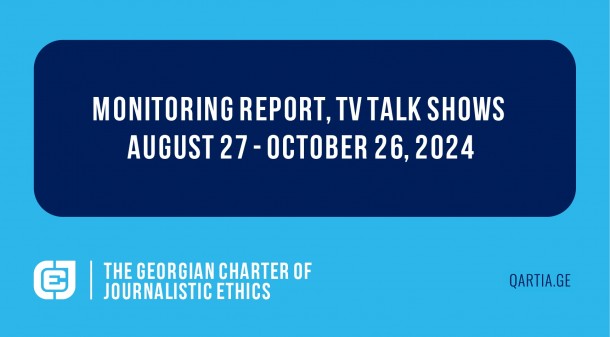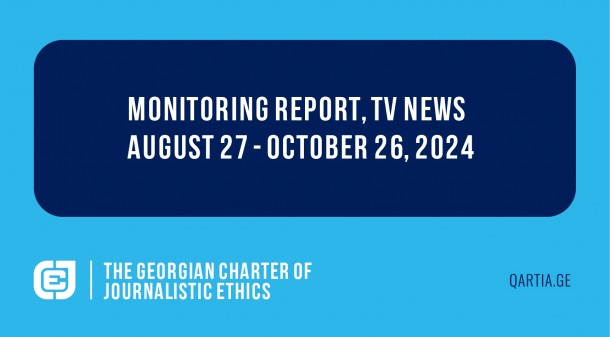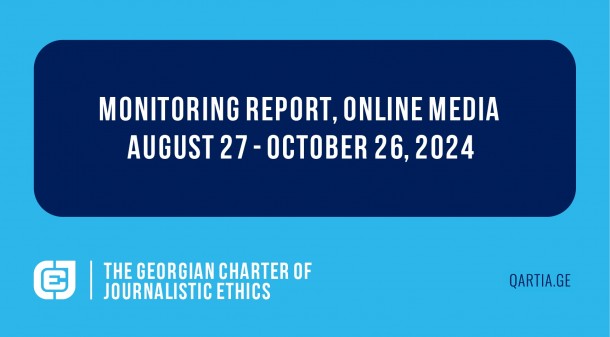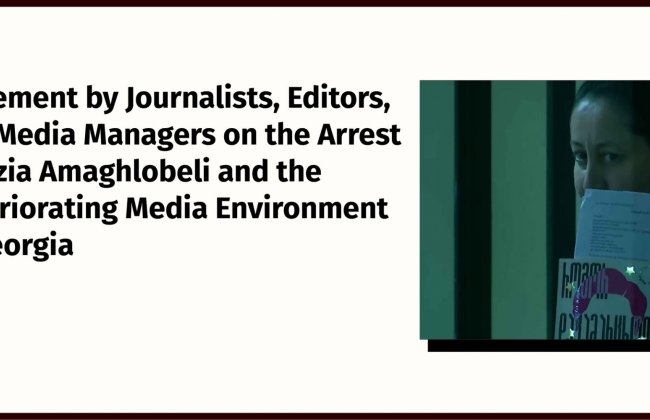21.12.2017
The final report of the research which examined media performance
during the 2017 Local Self-Government Elections in Georgia. The
monitoring covered 60 national and regional media outlets and
provided the quantitative and qualitative information on election
reporting, cases of bias, discrimination and hate speech. Supported
by the European Union (EU) and United Nations Development Programme
(UNDP), the election media monitoring was carried out by the three
Georgian civil society organizations – Georgian Charter of
Journalistic Ethics, Internews – Georgia, and Civic Development
Institute (CDI).See the report
Key Findings:
TV News
- Georgian Dream, and Local and Central Governments were allocated most of the time, based on the data of all monitored channels.
- In the previous years Government was allocated most coverage time on majority of channels. The tendency is different in these elections. The aggregated data of six 6 months shows that on six out of 14 channels most time was allocated to the Georgian Dream.
- The Georgian Dream was most positively covered by the First Channel of the Public Broadcaster, with 6% of the time allocated to it. Among the regional channels Georgian Dream was most positively covered by Gurjaani with 18% of the time allocated to it.
- The Georgian Dream was covered most negatively by Rustavi 2 (45%) from the central channels and by Odishi (54%) from the regional channels.
- The majority of regional channels allocated most time to Local Government.
- The Local Government was covered most positively on TV company Gurjaani, with 13% of the time allocated to it; most negatively on Rustavi 2, with 51% of the allocated time.
- Among central TV stations, the Government was covered most positively by the First Channel, with 9% of the time allocated to it. From regional channels, Gurjaani was leading by 25% in positive coverage of the Government.
- The Government was covered most negatively by Rustavi 2 (52%) from the central channels and by Odishi (47%) from the regional channels.
- Among the parties, the Georgian Dream was allocated the most time. The National Movement and European Georgia followed it.
- National Movement had the most positive coverage on Rustavi 2 (7%) among the central channels and on Gurjaani (20%) among the regional channels. From the central channels Obiektivi (80%) covered the National Movement most negatively. As for regional channels, it was Ajara TV (11%).
- If other channels covered the central and local Governments and the two major parties (National Movement and Georgian Dream) most frequently, TV company Obiektivi was the only channel where Alliance of Patriots had most coverage, as well as the highest indicator for the positive tone (12%).
- The most critical coverage towards authorities was demonstrated on Rustavi 2. Critical reporting on the Government was most present on Rustavi 2, compared to other channels.
- Rustavi 2 expressed evident sympathy towards the National Movement and its mayorship candidate.
- First Channel of the Georgian Public Broadcaster and Imedi TV were characterized by a soft, modest reporting towards the Government. The editorial policies of these two channels have come significantly closer after elections. In some cases, they prepared similar loyal reports towards the government.
- The TV company Obiektivi is distinguished by biased reporting in favor of the Alliance of Patriots and its mayorship candidate.
- Compared to the previous year, the cases of hate speech and inappropriate language in news programs have sharply decreased.
- Obiektivi is the only channel where xenophobic content was observed. 7
- Lack of in-depth election reporting that would help voters in making informed choice remains a challenge for almost all the channels.
- Facts of violation of a reasonable balance have reduced compared to the previous year. However, the so called short footages with sound bites were not always balanced
- The news programs were not always regularly broadcasted on regional channels. In cases, the schedule of programs was inconsistent and sometimes there was no news program for several days. This tendency continued after the first round of elections.
- Some regional channels used materials prepared by press offices of governmental agencies without clear indication of their origin.
- The advertising content was detected in news programs of several regional TV channels, which is inadmissible.
- Regional channels have technical problems, the quality of the sound and video is low, the titles for respondents are absent
Talk Shows
- Talk shows were dedicated to presentations of the election subjects rather than discussions. Hosts acted exclusively like moderators. Their questions were not related to visions or election programs of candidates. Accordingly, audience could not obtain information on how relevant were the promises of politicians and whether their problems would be eliminated in case of their fulfillment.
- Unlike 2016, national broadcasters offered the audience strictly structured talk shows, which hosted all qualified election subjects. Accordingly, criteria for invitation to the talk shows were clear. During these programs, major attention was paid to the format and not the content. Hosts were rather passive. They only gave general directions for conversation and did not ask follow-up questions even when candidates went off-topic.
- Broadcasting Company Rustavi 2 has not invited Tbilisi mayoral candidate from Movement of Development.
- Broadcasting Company Imedi has not invited Tbilisi mayoral candidates from Movement of Development and Labor Party for debates. The journalist stated that Labor Party candidate was not invited due to the offensive statement made regarding Imedi. However, journalists are often subject to criticism of politicians and this shall not influence selection of respondents, especially during the pre-election period.
- At three channels, which cover entire Georgia - Rustavi 2, Imedi and Public Broadcaster, Tbilisi mayoral candidates had to make similar statements. This occurred because the hosts did not ask critical, evidence-based questions on election programs. Instead, the hosts asked the candidates to share their opinion on variety of topics, which they had done many times previously, both on TV talk shows and in election commercials.
- Superficial questions and lack of preparation were even more obvious when knowledgeable and/or well-prepared respondents and experienced politicians were invited.
- In some cases, political party candidates were invited to the program in a different capacity: musician, journalist and etc. The audience was not informed that they were candidates as well. Girchi representatives were invited to programs particularly frequently. They expressed their opinions as experts, while other political parties were not present.
- Broadcasters mainly paid attention to the first round of elections. Upon its completion they evaluated the results. Second round of elections and participating candidates were not given attention in talk shows.
- Discussions between the candidates participating in the second round were not held at any regional channel, including those where competition between the candidates of the second round was fierce, for example, in Ozurgeti. In between the first and the second rounds of the 35 elections, Guria TV’s talk show was broadcasted only once and only representatives of local Assembly were invited. In this regard, Trialeti was an exception, as it hosted Khashuri mayoral candidates participating in the second round of elections.
- National broadcaster Obiektivi has allocated significant attention to the second round of elections in Borjomi. Alliance of Patriots has made it to the second round of elections in Borjomi and this must have been the main reason of interest for Obiektivi. In total, 91 representatives of this party have participated in the program, while only 8 representatives of other parties have been invited to the show. From 8 representatives of other parties, 3 had joined the show via phone as they were not present at the studio. Also, the program was used to mobilize people to the demonstration organized by the Alliance of Patriots. The program was full of anti-western and anti-Turkish rhetoric, hate speech, offensive vocabulary and unanswered allegations against opponents.
- Apart from Obiektivi, hate speech has been observed in case of several other channels. However, it was mainly used by the respondents. The reaction of hosts was critical and adequate. In some cases, hosts contributed to strengthening gender stereotypes.
- Number of regional channels have completed programs commenced during the pre-election period upon completion of the first round of the elections; some talk shows were aired without a consistent schedule.
- Broadcasting companies Gurjaani and Odishi are exceptions, as they did not offer talk shows to the audience with consistent schedule. Gurjaani aired talk show with invited candidates only once and “Odishi” twice. However, the hosts acted as a moderator and tribune was given to the candidates.
- Regional broadcasters still had significant technical issues related to voice, visual side and branding. All these issues, along with content related problems made programs less attractive to the audience.

